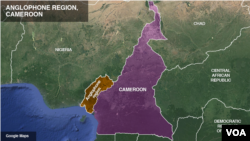Cameroon’s government has ordered the reopening of dozens of schools in the north that were deserted following attacks by Boko Haram. But turnout has been low amid continued security concerns.
It was quiet Thursday morning at the government primary school in Tiriwa, a village 13 kilometers from Fotokol, a town on the Cameroon-Nigeria border.
The government ordered the school reopened this week, but no one has shown up for class.
The school was closed after Boko Haram fighters attacked the village in April 2015. The assailants shot and burned to death about 30 civilians and wounded another 50. The surviving villagers escaped.
In all, the Boko Haram insurgency has displaced about 200,000 people in northern Cameroon since the attacks first spread from Nigeria in 2014.
Recently, Cameroon's government has been urging IDP's to return home to farm, and the government has reopened at least 40 schools in the Far North region.
Aminou Sanda Zoa is the government delegate in charge of elementary education in the region.
He says 124 schools were closed last year and the suicide bombings have made them reluctant to re-open some of the establishments. But he says their ultimate goal is to open all the closed schools.
Nigerian and regional troops have taken back most of the territory that Boko Haram once controlled, but the terrorists have remained a threat.
Amnesty International says since April, civilian casualties have climbed amid a spike in suicide bombings, with at least 381 people killed in northeastern Nigeria and Far North Cameroon.
Many teachers still fear for their lives and have not returned to service, according to Midjiyawa Bakari, governor of the Far North region of Cameroon.
He said the over 400 teachers who have abandoned schools because of the Boko Haram insurgency have turned down calls to return. He said those teachers will be called to the disciplinary council of Cameroon’s civil service.
Bakari said local authorities have drawn up a strategy with the military and self-defense groups to help people who fled to return to their villages. He said the military has also been teaching children in schools in some villages prone to Boko Haram attacks.
The governor said education is a fundamental human right and that is why they have made reopening the schools a priority.
At the government high school in the border town of Fotokol, about 900 of the expected 1,700 students returned to class this week.
The high school students told VOA they are happy to be back in class, but that they are also scared. Some spoke of their friends who were killed or wounded when Boko Haram attacked the school two years ago.
Lamine Bouba, one of the teachers, said they have increased security measures.
He said all school children have to be searched systematically before being given access to the institution. He said they are felling all trees in the forest near their school to increase visibility stop potential suicide bombers from hiding there and to increase visibility.
The government insists that the decision to reopen schools is not premature. Officials say Boko Haram has not carried out mass raids in the area since May and that adequate measures have been taken to check suicide bombings.




